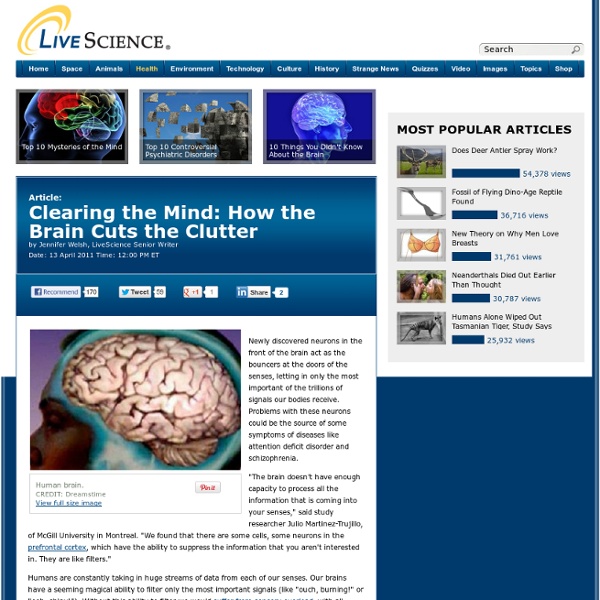Morality Study Narrows Gap Between Mind And Brain
Our brains are wired so we can better hear ourselves speak, new study shows
Like the mute button on the TV remote control, our brains filter out unwanted noise so we can focus on what we’re listening to. But when it comes to following our own speech, a new brain study from the University of California, Berkeley, shows that instead of one homogenous mute button, we have a network of volume settings that can selectively silence and amplify the sounds we make and hear. Activity in the auditory cortex when we speak and listen is amplified in some regions of the brain and muted in others. In this image, the black line represents muting activity when we speak. (Courtesy of Adeen Flinker) Neuroscientists from UC Berkeley, UCSF and Johns Hopkins University tracked the electrical signals emitted from the brains of hospitalized epilepsy patients. Their findings, published today (Dec. 8, 2010) in the Journal of Neuroscience, offer new clues about how we hear ourselves above the noise of our surroundings and monitor what we say.
Human Connectome Project | Mapping the human brain connectivity
Paul Thompson's Research Publications
The brain's center of reasoning and problem solving is among the last to mature, a new study graphically reveals. The decade-long magnetic resonance imaging (MRI) study of normal brain development, from ages 4 to 21, by researchers at NIH's National Institute of Mental Health (NIMH) and University of California Los Angeles (UCLA) shows that such "higher-order" brain centers, such as the prefrontal cortex, don't fully develop until young adulthood. A time-lapse 3-D movie that compresses 15 years of human brain maturation, ages 5 to 20, into seconds shows gray matter - the working tissue of the brain's cortex - diminishing in a back-to-front wave, likely reflecting the pruning of unused neuronal connections during the teen years. Cortex areas can be seen maturing at ages in which relevant cognitive and functional developmental milestones occur. The researchers scanned the same 13 healthy children and teens every two years as they grew up, for 10 years. [1] Nitin Gogtay MD, Jay N.
100 Ways To Become More Conscious: How To Raise Your Consciousness
1. Connect with nature – Go for a walk in the forest, jungle, field of daisies, or wherever you feel like getting a connection with nature. 2. – Exercise and dancing will raise your consciousness by promoting healthy brainwave patterns, healthy neurotransmitter levels, and great circulation throughout your nervous system. 3. - Whether you are an advanced meditator or a beginner, the benefits are tremendous and will allow you to tap into your highest state of conscious functioning if you stick around long enough. 4. - Find only friends that align with who you are, your beliefs, and your values – they will make you more conscious. 5. – If you have the intention to raise your consciousness and state of awareness, you are on the right track. 6. - Anytime you tell the truth, you raise your level of consciousness. 7. - Searching for a purpose will help you find your true purpose here on Earth. 8. 9. - Being open-minded is a key aspect in the process of becoming a more conscious individual.
Antoine Lutz's Homepage
I am currently an associate scientist at the Waisman Lab for Brain Imaging & Behavior at the University of Wisconsin-Madison. I am doing my research in collaboration with Prof. R. J. Davidson and several researchers from his lab. Contact: Waisman Laboratory for Brain Imaging & Behavior University of Wisconsin-Madison 1500 Highland Avenue Madison, WI 53703-2280 (tel) (1).608.262.8705 (fax) (1).608.262.9440 alutz@wisc.edu I am interested in understanding the neural counterparts to subjective experience and, more generally, the mechanisms underlying mind-brain-body interactions. Current researches and collaborations include: Neuro-functional (fMRI) and neuro-dynamical (EEG) study of several standard meditative states (concentration/mindfulness, compassion and loving-kindness, and open presence meditations) in a group of highly trained Buddhist practitioners (more than 10, 000 hours of meditation in life).
Global Consciousness Project -- consciousness, group consciousness, mind
Francisco Varela : Human Consciousness : Articles
‘Neurophenomenology : A Methodological Remedy for the Hard Problem’ Journal of Consciousness Studies, "Special Issues on the Hard Problems", J.Shear (Ed.) June 1996. HTML Version ‘The Specious Present: A Neurophenomenology of Time Consciousness’ To appear in:J.Petitot, F.J.Varela, J. HTML Version PDF Version The Gesture of Awareness - An account of its structural dynamics N. PDF Version First-person Methodologies: What, Why, How? Francisco J. HTML Version



